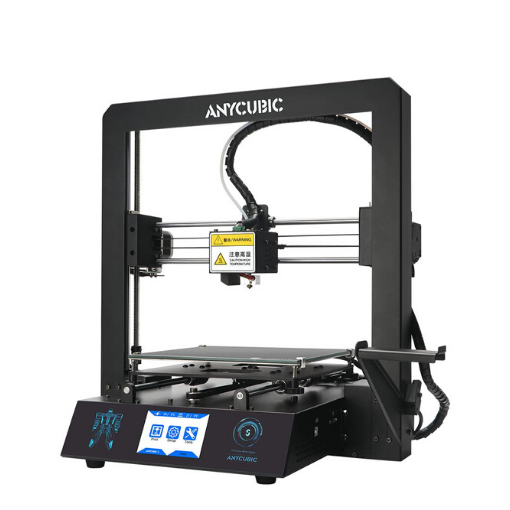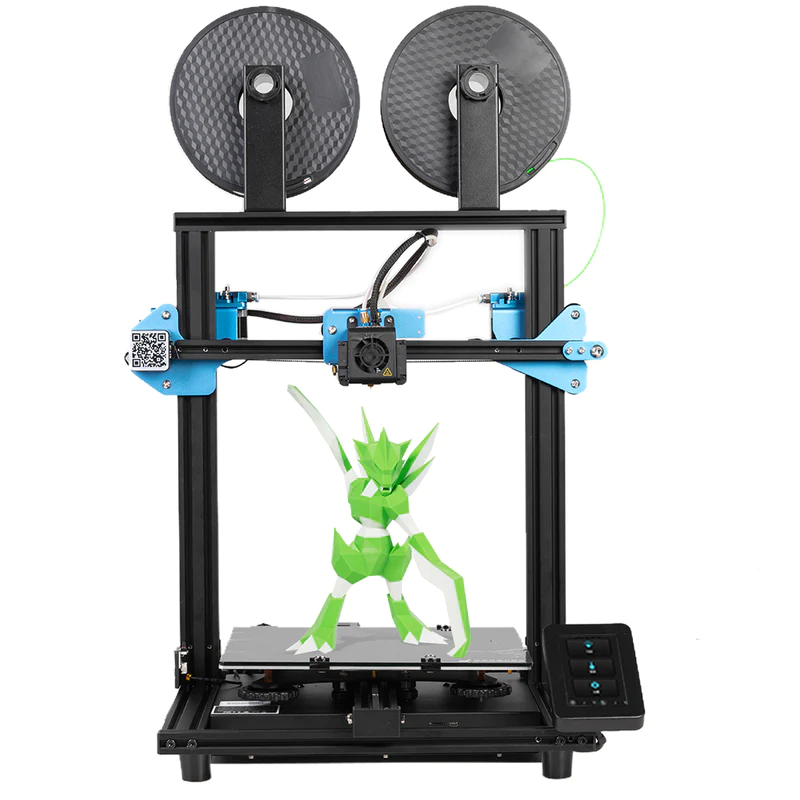Compare Mega S vs SV02
Comparison between the best 3D printers
Choose the best 3D printer at the best price. The cheapest 3D printers are here.
Buy a 3D printer here with 3D Fila.
 |
 |
|
| Model | Mega S |
SV02 |
| Printing Material | Filament | Filament |
| Buy Filament for Anycubic Mega S | Buy Filament forSovol SV02 | |
| Estimated price | $149,00 | $209,00 |
| Manufacturer | Anycubic | Sovol |
| Release Year | 2019 | 2020 |
| Print Volume [mm] | 210x210x205 | 280x240x300 |
| Printer Size [mm] | 405x410x452 | 539x493x710 |
| Weight [kg] | 14,5 | 11,86 |
| Power Loss Recovery | YES | YES |
| Enclosed printer | NO | NO |
| Bed Leveling | Manual | Manual |
| Filament End Sensor | YES | NO |
| Bed type | Heated | Heated |
| Power supply system | Bowden | Bowden |
| Standard nozzle | 0,4 | 0,4 |
| Maximum Nozzle Temperature [°C] | 260 | 260 |
| Maximum Bed Temperature [°C] | 110 | 110 |
| Maximum printing speed [mm/s] | 100 | 120 |
| Filament holder | YES | YES |
| Camera for supervision | NO | NO |
| Recommended filaments | PLA, TPU, ABS, PETG | PLA, PETG, Tritan, Flex, ABS |
| Recommended slicers | Cura, Simplify, Slic3r | Cura, Simplify, Slic3r, IdeaMaker |
| Maximum Resolution [mm] | 0,1 | 0,1 |
| Processor | 8 bits | |
| Display | Touchscreen TFT 2,8'' | Display touchscreen 4,3'' |
| Power Supply | 12V / 300W | |
| Connectivity | SD / USB | SD / USB |
| Operating systems | Windows, Mac, Linux | Windows, Mac, Linux |
| Date of registration in the system | 2021-04-15 | 2022-11-10 |
| Release date | 2019 | 2020 |
| Extra features | The Anycubic Mega S offers a printing platform with excellent adhesion, easy removal after cooling. It has a filament sensor for a better experience with flexible materials and a multilingual and intuitive color touchscreen. Assembly is quick, requiring only 8 screws and 3 connections. It has a large build volume (210 x 210 x 205 mm), high positioning accuracy and supports a variety of materials, including TPU, PLA, ABS and wood. It stands out for its solid metal structure, superior stability, high-quality printing with layer resolution of up to 50 microns, Ultrabase for easy adhesion and removal of parts, resumption of printing after power outage, high-quality extruder for flexible filaments, suspended filament support and stable structure that reduces shaking, improving printing quality. | The Sovol SV02 is a dual extrusion 3D printer with two inputs and one output hotend, silent motherboard and 4.3" color touchscreen. It includes a tempered glass platform for glue-free adhesion, dual Z-axis for more stability, and fast heating with Mean Well power supply. It has a resume printing function and support for upgrades, such as an automatic leveling sensor. |
| Support for multiple colors and materials (AMS and CFS) | NO | NO |
Notes * |
||
| Cost-benefit | 7 / 10 | 7 / 10 |
| Hardware | 2 / 10 | 1.5 / 10 |
| Tela | . | . |
| Print volume | 3 / 10 | 4 / 10 |
| Performance | 1 / 10 | 1 / 10 |
Conclusion |
| In comparing the Anycubic Mega S and the Sovol SV02, both printers offer unique advantages but cater to different user needs and preferences. The Mega S stands out for its affordability and user-friendly features, including a filament end sensor and a solid build quality that ensures good adhesion and stability during printing. Its print volume is more modest than the Sovol SV02, but it compensates with its excellent ease of use and support for a wide variety of materials, making it an excellent choice for beginners and hobbyists. On the other hand, the Sovol SV02, despite its higher price, offers a larger print volume and more advanced features, such as dual extrusion capabilities and a quieter operation. However, it lacks a filament end sensor, which may be a consideration for users seeking a more automated experience. It also supports a diverse range of filaments and has robust stability features due to its dual Z-axis. In conclusion, if budget constraints and ease of use are priorities, the Anycubic Mega S is the more economical option that still provides reliable performance. For users seeking larger print capabilities and are willing to invest more, the Sovol SV02 presents itself as a worthy contender. Ultimately, the choice should reflect the user’s specific requirements and experience level in 3D printing. |

